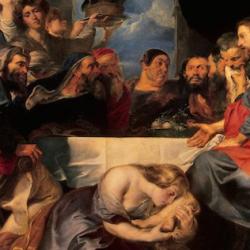Exhortation for November 16:
We often read Scripture with far too little attention. At times, the stories are so familiar that they just glide past us without our really hearing what is said or read. At other times, the stories are so bizarre that we have a hard time beginning to grasp what is going on. At still other times, Scripture appears to be little more than a grab-bag of randomly organized events.
But we must read with attention, and attention even to the slightest details of the text. Everything in Scripture, we believe, comes from God, everything is a product of His breath, and so we should read like starving people who want to receive every morsel that we can. We should read like that because that is in fact the situation.
Today’s sermon text provides a number of illustrations. In response to a report about Galileans being slaughtered with their sacrifices, Jesus adds a comment about “eighteen” who were killed by a falling tower in Siloam. The number “18” has no obvious significance in Scripture, and it is not found just over 20 times in the whole Bible. But it’s found two other times in this same chapter: The woman Jesus heals on the Sabbath has been bound by a spirit of infirmity for 18 years, a fact that both Luke and Jesus mention. Gee, we think, what are the chances that this number would appear THREE TIMES in a single chapter? But there is no chance about it. The number 18 links the two stories, and contrasts them. Jesus has come for the rising and falling of many in Israel. Some will be crushed like those 18 under the tower of Siloam, while others will be “straightened up” even after an 18-year affliction. Whether you’re among the 18 who perish or with the woman who is raised up after 18 years depends entirely on whether or not you are with Jesus.
Or, take Jesus parable about the closing of the door. Strive to enter by the narrow door, He warns, since the time is fast approaching when the door will be shut. Jesus said the door will be shut when the “head of the house arises and shuts the door.” Now, Luke uses two different words for “rise up”: One of them is used when people rise up to do a task, and the other is used when people rise up from affliction or death. Here, Jesus uses the latter, and by using that word turns this warning into something like a prophecy. Jesus is the head of the house; soon He will be killed, but after He is killed, He will rise up from the grave and shut the door. Those who do not believe after He has risen from the dead will be left outside the banquet hall, watching the feast.
Or, take Jesus’ wish at the end of the chapter, that the children of Jerusalem would gather to Him like chicks under the wings of the mother hen, so that they might be protected and saved. A charming image, to be sure. But far more than that. In Deuteronomy 32:11, the Lord is described as an eagle hovering over Israel as they departed from Egypt, and elsewhere in the OT we’re told that the Lord took Israel on eagle’s wings to bring them out of bondage in Egypt to freedom. And so Jesus, Yahweh incarnate, wishes to gather Israel to Himself and lead them on another exodus, hovering over them like a protecting mother bird as He leads them out of Egypt into a promised land.
We come to Scripture as starving people looking for every crumb of food we can find. But when we pay attention to the details of the text, when we read and study with attention, we find that we are not receiving mere morsels. We find rich and delightful food, a banquet. We find that we have entered a garden of delights.











